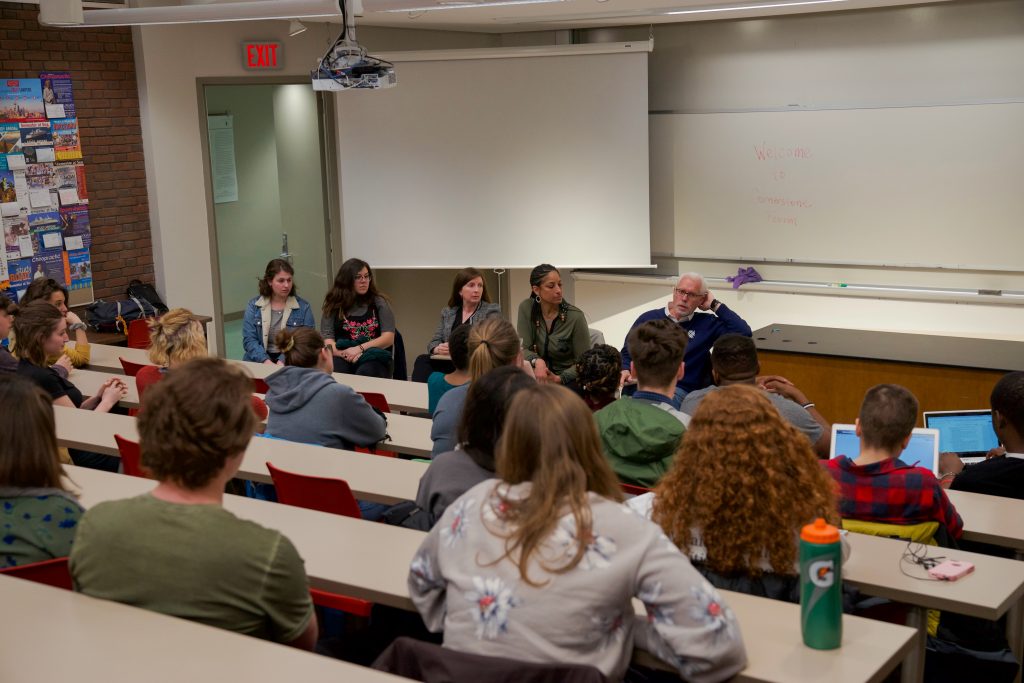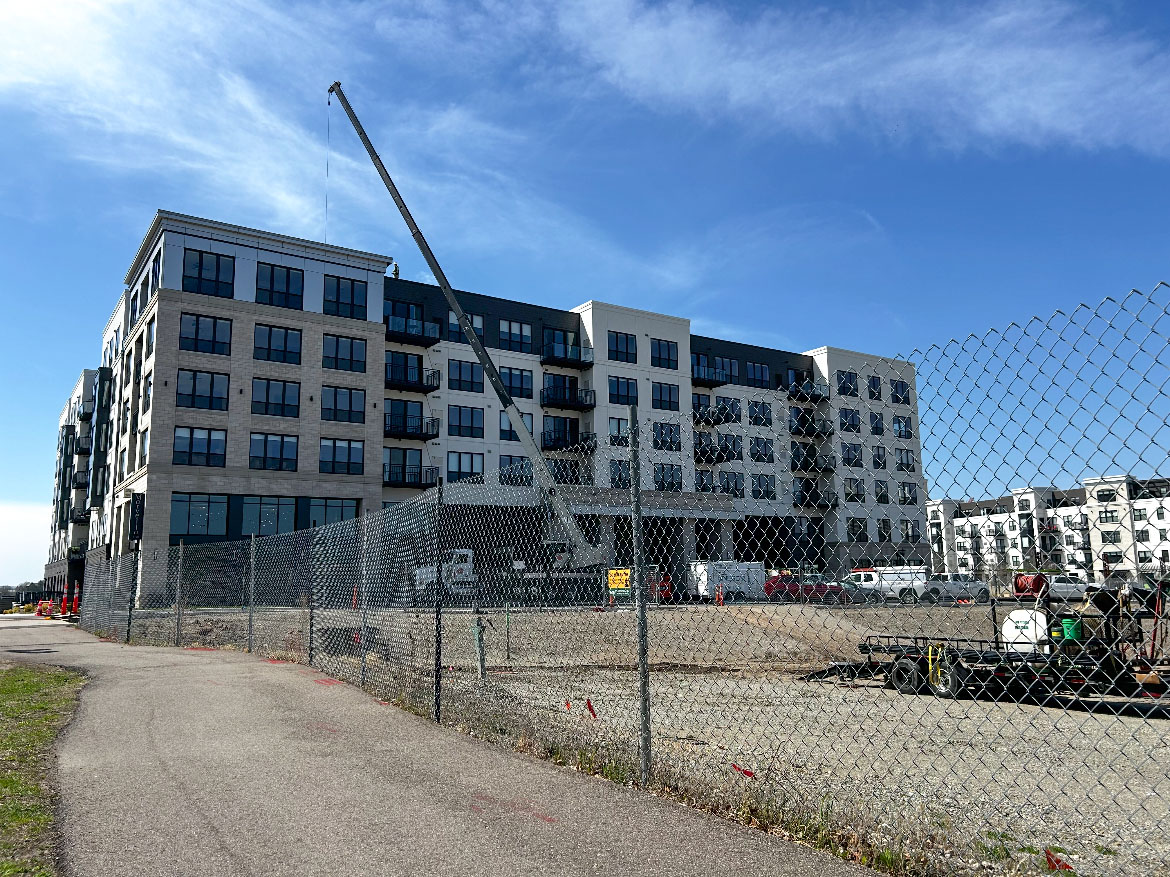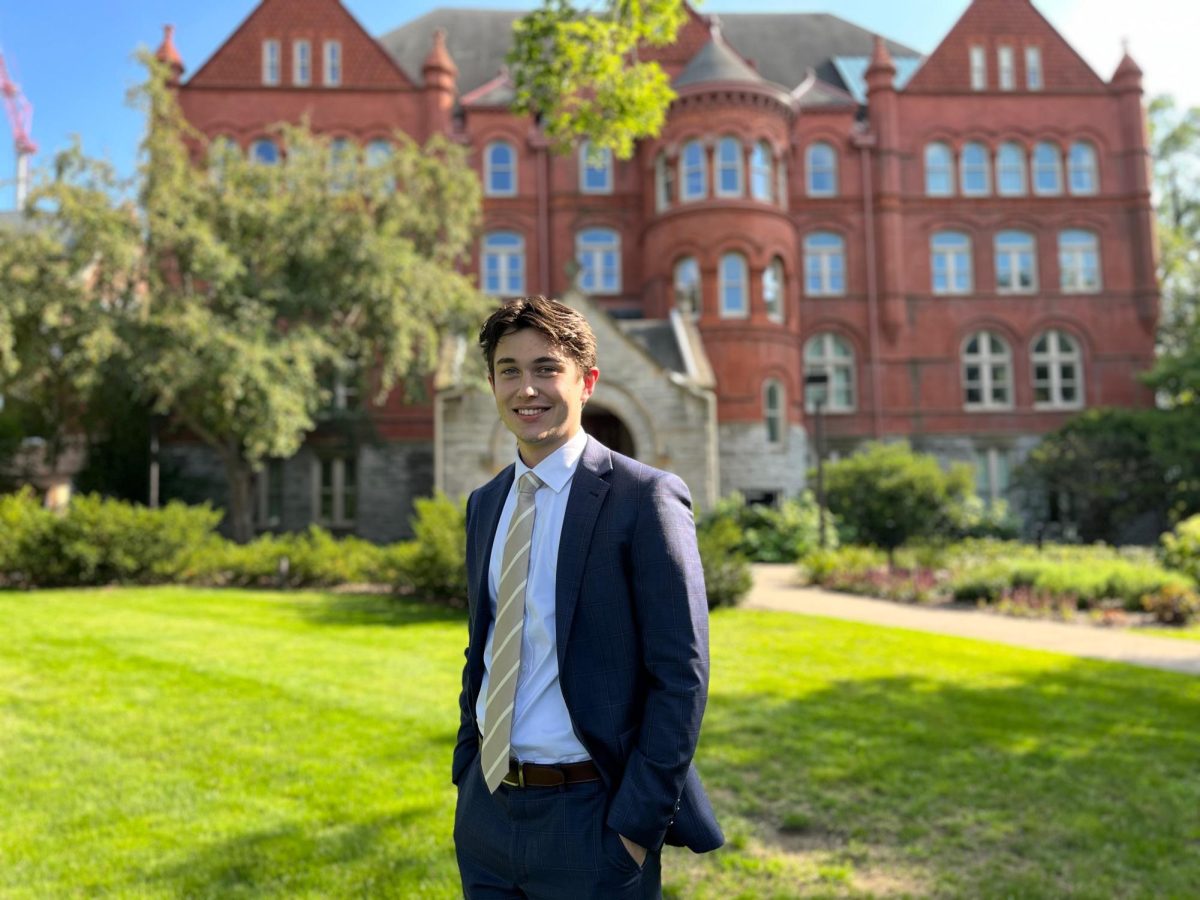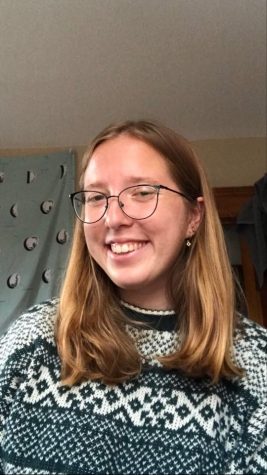
On Tuesday, April 17, students gathered in the Olin Rice Science Hall for the last Cornerstone Forum of the semester featuring President Brian Rosenberg, Provost Karine Moe and Vice President for Student Affairs Donna Lee.
The panel gave brief descriptions of their positions before opening the floor for student questions. The discussion that followed focused on the paths Macalester must travel to cultivate a healthier and more inclusive campus community.
Several students, including MCSG President-elect Malik Mays ’19, were specifically interested in the ways students can hold professors accountable for how they build classroom culture and handle issues of inclusion, diversity and difference.
“People want to know – where is the student input?” Mays asked. “What would be the best avenue to have [a student’s] voice heard and also [to] protect them?”
Moe encouraged students to speak to faculty about issues important to them whenever possible, though she acknowledged that in some situations, given the nature of the relationship, it might be difficult for students to talk about sensitive subjects.
While there is some discussion amongst administration about having a panel for students and faculty on the issue of inclusion in the classroom, Lee was quick to point out that public venues like this can put pressure on students to share personal or painful experiences.
One student in the audience suggested that giving students the ability to anonymously share their experiences might be the best option for those struggling with the classroom culture, an idea that Lee reacted especially positively to.
The forum spent several minutes discussing the ways in which course evaluations could be used to emphasize inclusivity and culture as core to what matters in Macalester classes.
There is, however, an extensive bureaucratic process involved in standardizing the evaluation sheets, as has been proposed in various outlets including MCSG. The change would require a two-thirds up vote from the faculty.
Moe, who has spent several years trying to standardize evaluations, has yet to get the issue to a vote.
In the fall, faculty will attend a retreat where they will discuss, among other things, issues of inclusivity in the classroom.
“If we can begin by getting 100 or 125 faculty members in a room to talk about these issues, that’s a start… then we have to figure out ways to make it ongoing,” Rosenberg said. “It’s really hard. It’s not an excuse, it’s just a reality.”
The forum also discussed the high rate of faculty turnover, particularly among faculty of color.
Rosenberg highlighted affirmative action programs for faculty and staff, and all panel members agreed that intentional hiring was a step in the right direction if not a definitive answer.
The systematic supports for faculty and staff of color become weaker once they begin working.
“There are a lot of informal things,” Lee said. “I will say we are probably not as diligent as we could be and part of that has to do with the fact that we’re all so busy… it’s been named, there’s a desire, it’s just carving out the space and time.”
“I think the limiting factor on this campus… in terms of creating an inclusive community, [is that] it falls on the shoulders of a finite group of people,” Rosenberg added. “We have to figure out how to teach [faculty] how to become more inclusive in the classroom and we have to try to inspire them to make this a priority.”
Overall, the panel acknowledged the need for broad change on campus at a cultural level. But that change will require serious commitment from all parts of the Macalester community, rather than only on a few individual members.
“I see us being challenged to rethink the way we deliver education, how we’re teaching it, who’s teaching it, what’s being taught, how we deliver services,” Lee said. “We’re already starting to see an influx of younger faculty who’s asking some of those bold questions and pushing us in those new directions.”
“Macalester has a great history of self-improvement,” Rosenberg said. “Not perfection. But self-improvement.”
As the organizers and founders of the Cornerstone Forums – Mara Steinitz ’18, Malik Earle ’18 and Maxine Freedman ’18 – are all set to graduate in May, Gabi Estrada ’21 and Ariel Hasak-Lowy ’21 will take their places next year.







Dorothy Langdon • Sep 5, 2019 at 9:32 am
I am glad to be one of the visitants on this great internet site (:, thankyou for posting.
RosalieFluch • Aug 30, 2019 at 6:31 am
Кто в сети? Пообщаемся?
bigmarket • Aug 26, 2019 at 6:22 pm
Отличный интернет магазин хорошие скидки и бесплатная доставка
http://bigmarket24.ru
Kevintum • Aug 22, 2019 at 7:45 pm
Как собрать li-ion аккумулятор 48V для электровелосипеда из банок типа 18650 своими руками.
Dafzaimlor • Aug 1, 2019 at 2:54 am
Список новые займы онлайн находится на нашем сайте все-займы-тут.рф
Если случилось так, что Вам на данный период жизни потребовалось взять онлайн кредиты на банковскую карту без отказа то наш сайт будет Вам кстати. Вы потратили весь бюджет, а до зарплаты ещё неделя? Неожиданные растраты могут быть связаны с чем угодно, может быть это приезд друзей, внеплановый отпуск или праздник. Или у Вас произошел печальный случай, например, болезнь, которая требует затратного лечения. В абсолютно любой ситуации мы будем рады Вам помочь уладить Ваши временные финансовые неприятности.
Мы даем материалы о всех микрозаймовых компаниях, их услугах и методах получить положительный ответ 100 %. Это совершенно бесплатно, переходите на наш сайт и получайте много полезной информации. Нам доверяет огромное количество жителей России, которые уже сумели воспользоваться услугами микрофинансовых организаций через наш сайт.
Быстрые займы нередко очень спасают нас в трудных ситуациях, а всё потому что это самый быстрый способ займа денежных средств. Вам не требуется ходить в офисы банка, заполнять документы, приглашать поручителей, занимать у друзей в долг. Всё что Вам понадобится-это возраст 18 лет, Российский паспорт, интернет и мобильный телефон. А также нужна банковская карта, если Вам будет удобно получить денежные средства этим способом.
Перед заполнением заявки следует ознакомиться с предложенными условиями микрозаймовых компаний. Все компании осуществляют работу на разных процентных тарифах, промежутке гашения и способах получения денег. Выбирайте то, что подходит именно Вам. На сегодняшний день рынок онлайн займов переполнен от конкуренции, поэтому бывает трудно выбрать надежную микрофинансовую организацию.
Мы подобрали для Вас список самых популярных предложений от лучших МКК. Можете отправлять заявку без опасений, что Вас обманут. При оформлении анкеты на микрозаймы онлайн на карту без отказа срочно обязательно вводите свои личные данные верно, в противном случае Вы не получите положительный деньги, ведь данные будут проходить автоматическую проверку. Если у Вас плохая кредитная история или имеется неоплаченный кредит, не стоит расстраиваться, ведь некоторые МФК могут дать Вам положительный ответ при сложившихся условиях. Просто заполняйте заявки сразу в несколько компаний, чтобы умножить шансы.
Онлайн займы имеют большое количество положительных качеств. После того, как Вам пришел положительный ответ, деньги мгновенно поступают на Вашу банковскую карту. Погасить займ можно также, в онлайн режиме. Если соблюдать все условия, то переплата будет минимальная, а многие МКК представвляют акционные предложения для своих заемщиков и могут оформить Вам первый займ без процентов. Также, если Вы оплачиваете быстрый займ без отсрочек, то у Вас будет положительная кредитная история, а плохая-может улучшиться.
Что бы не произошло в Вашей жизни, мы желаем в ближайшем времени наладить Ваши финансовые проблемы и рады пригласить Вас на лучший сайт все-займы-тут.рф с базой микрокредитными организациями.
Dazimesobevy • Jul 14, 2019 at 1:53 am
Оформить микрозайм онлайн на карту можно здесь все-займы-тут.рф
Если случилось так, что Вам на настоящий момент жизни потребовалось взять займы онлайн на карту то наш сайт будет Вам пригоден. Вы потратили весь бюджет, а до зарплаты ещё две недели? Неожиданные растраты могут быть связаны с чем угодно, возможно это свадьба родственников, внеплановый отпуск или поездка. Или у Вас произошел печальный эпизод, например, болезнь, которая требует затратного лечения. В совершенно любой ситуации мы будем рады Вам помочь уладить Ваши временные финансовые вопросы.
Мы даем информацию о всех микрофинансовых организациях, их услугах и методах получить одобрение 100 %. Это совершенно бесплатно, переходите на наш сайт и изучайте множество нужной информации. Нам доверяет огромное количество жителей России, которые уже смогли воспользоваться услугами микрозаймовых организаций через наш интернет ресурс.
Быстрые займы иногда очень спасают нас в непростых ситуациях, а всё потому что это самый быстрый способ займа денежных средств. Вам не требуется ходить в офисы банков, оформлять справки, приглашать поручителей, занимать у знакомых в долг. Всё что Вам нужно-это совершеннолетие, паспорт РФ, выход в интернет и мобильный телефон. А также пригодится банковская карта, если Вам будет удобно получить деньги этим способом.
Перед заполнением заявки советуем ознакомиться с предложенными условиями МФК. Все компании осуществляют работу на разных процентных ставках, сроках погашения и методах перечисления финансовых средств. Выбирайте то, что подходит именно Вам. На сегодняшний момент рынок срочных займов переполнен от конкуренции, поэтому бывает трудно выбрать безопасную МФК.
Мы подготовили для Вас список самых популярных предложений от лучших организаций. Можете оформлять заявку без сомнений, что Вас обсчитают. При заполнении анкеты на займы на карту мгновенно непременно вводите свои собственные данные правильно, в ином случае Вы не получите положительный деньги, ведь данные будут проходить автоматическую проверку. Если у Вас плохая кредитная история или есть открытый кредит, не стоит отчаиваться, ведь многие МКК могут дать Вам удовлетворительный ответ при таких условиях. Просто заполняйте заявки сразу в 3-5 компаний, чтобы увеличить шансы.
Микрозаймы имеют большое количество положительных качеств. После того, как Вам пришел положительный ответ, деньги мгновенно поступают на Вашу банковскую карту. Гасить займ можно также, в онлайн режиме. Если исполнять все условия, то переплата будет минимальная, а многие МФК представвляют специальные предложения для своих клиентов и могут оформить Вам первый займ без переплаты по процентам. Также, если Вы оплачиваете срочный займ без задержек, то у Вас будет хорошая кредитная история, а плохая-может улучшиться.
Что бы не произошло в Вашей жизни, мы желаем в ближайшем времени наладить Ваши денежные трудности и рады пригласить Вас на лучший сайт все-займы-тут.рф с базой МКК.
IverinaNeria • Jun 9, 2019 at 2:26 pm
Уважающие себя дамы и мужчины всегда следят за собой. Большое количество парней и женщин ухаживают за стопами, лицом. Если вы ухаживаете за собой дома, вам нужны определенные аксессуары по уходу. Если вы хотите приобрести бальзамы или гели, в составе которых находятся исключительно натуральные элементы, вам надо обратиться в интернет-магазин Beauty Line.
На beautyline-shop.ru – интернет магазин профессиональной косметики вы можете купить крутые спреи и шампуни для волос. Если вы хотите найти и купить мужские аксессуары, на ресурсе размещена огромная подборка мужских товаров. Вы можете найти тапочки, бритвы и даже щетки. Если вам нужны по уходу за телом качественные вещи, большое количество таких есть на портале. Если вы хотите выглядеть прилично, пользуйтесь средствами, в которых содержатся натуральные вещества. Большое количество таких есть в интернет-магазине. Сегодня всё больше и больше мужчин по всему миру отдают предпочтение товарам из натурального происхождения.
Вы можете найти и заказать в интернет-магазине средства для макияжа. Они максимально безопасны. Среди них можно найти: сыворотки, тональные основы, скрабы, бальзамы и т.д. На портале вы можете искать определенные товары по поиску. Достаточно много крутых брендов представлены на ресурсе. Если вы желаете сделать заказ, вам нужно соединиться с консультантами по телефону +7(123)456-78-90. Менеджеры интернет-магазина очень быстро отвечают на любые вопросы посетителей. Если вы хотите получить консультацию по краскам для бровей, вам ответят на все ваши вопросы.
Вы можете заказать на косметика интернет магазин сушки для ногтей. Если вам потребуются особые средства, они также есть. Вы можете проконсультироваться с менеджерами интернет-магазина по поводу любых товаров. Если вы хотите приобрести лечебные средства или маникюрный набор, всё это можно найти на портале. В интернет-магазин регулярно поступают новые товары. Среди новых поступлений на данный момент есть средство для профессионального лечения волос.
Если вы прежде не приобретали товары в интернет-магазине, сделать это очень просто. Вы можете также приехать по адресу Россия, 119571 Москва, проспект Вернадского, 86А и забрать лак лично. Оплатить товары можно на месте наличными или кредиткой Visa или MasterCard. Если вас интересует какой-то определенный товар, вы можете найти его в поиске. На ресурсе очень много мицелярных вод. Вы можете приобрести маску для лица или пудру с лечебными свойствами. По всем вопросам вы можете обращаться к сотрудникам интернет-магазина по телефонам.
Stazaimaparo • May 30, 2019 at 4:21 am
Взять мгновенный займ на сайте MEGA-ZAIMER.RU
Разные ребята привыкли при необходимости брать займы в паутине. В интернете существует большое количество веб-сайтов, которые позволяют брать деньги в займ онлайн. В данные момент не 90ые и нет нужды посещать банк, чтобы взять займ. Вы можете зайти на mega-zaimer.ru и оформить заявку на получение займа.
На данный момент на ресурсе есть разные варианты займов. Вы можете получить займы на карту мгновенно круглосуточно без отказа при этом сумма займа может быть 1000 рублей, а может быть 20000 рублей. Чтобы вы могли получить денежные средства, вам надо иметь банковскую карточку. Оптимально, чтобы эта кредитка была одного из банка России. В этом случае перевод будет произведен моментально.
Стоит отдельно сказать и о том, что вы можете оформить займ в интересующих Вас компаниях. Как вариант может быть, как E-Капуста, так и Zimon, а также есть микрокредиты на банковскую карту. Вы можете без особых вопросов получить займ буквально за 10 минут. Вам необходимо будет заполнить анкету и при необходимости ответить на вопросы менеджера. Для получения займа нужно указать личные данные и номер телефона, на который может поступить код активации.
Одобрение происходит невероятно быстро. Необходимо отметить и то, что все сервисы предоставляют гарантировано деньги. На ресурсе подобраны МКК, у которых адекватные процентные ставки. Несмотря на то, что онлайн займы на карту без отказа получить в банковских учреждениях сейчас трудно, взять займ в одном из МФО очень легко. Вы можете взять денежные активы на срок от 5 до 30 суток с возможностью продления займа.
На https://mega-zaimer.ru/bez-otkaza/mikrokredit-momentalno/ у вас есть возможность выбрать МФК, которое подойдёт именно Вам! На портале собран каталог лучших компаний. К сожалению, в жизни могут быть разного рода расходы, и онлайн займ может быть очень кстати. Если вы желаете получить займ на карту онлайн следует сделать выбор среди МФО на портале. Это позволит вам в сжатые сроки решить любые вопросы с незапланированными расходами. Сегодня не все могут получать хорошую зарплату, из-за чего в любое время могут появиться денежные вопросы.
Отдельно необходимо сказать, что у каждого сервиса существует своя служба поддержки. Это очень важно, ведь при получении займа могут появиться любые вопросы, будь это организационные или технические. Решать такие вопросы стоит сразу. Если вам нужны финансы на лечение, но в банковском учреждении вы не сможете получить их, а у родственников брать не выходит, рекомендуем обратиться в МФО. Вы легко сможете получить нужную сумму и решить свои финансовые вопросы.
terwixonse • May 17, 2019 at 5:08 am
I am from Slovenia. I can help with build this forum. Thanks for approved.
Jaz sem Slovenka. Lahko pomagam pri razvoju foruma.